七下Unit_2_学案
湖南省株洲市天元区马家河中学七年级英语下册《Unit 2 Where is the post off

湖南省株洲市天元区马家河中学七年级英语下册《Unit 2 Where isthe post office 》学案人教新目标版[学习重点]1.词汇:post office, library, restaurant , bank, supermarket, pay phone, street , park, avenue, bridge, center.across from , in front of ,behind, next to.between.2.语法功能:学习一些问路的句子 Grammar focus .3.重点:Is there a supermarket ? Yes, there is ./No, there isn’t.4.难点:Is there a supermarket ? Yes, there is ./No, there isn’t .where is ……? It is in front of ……【学习目标】1、学会询问某一场所的位置。
2、学会如何问路【学习过程】一.预习指导与检测(一)预习指导1) 根据音标预习第七页的生词,做到会读知意2) 复习学过的表示方位的介词3).知识点拨:A.句子There be 的用法。
There be + 名词(人或者物)+介词短语e.g. There is a bank near here. There are two pay phones in the park.Is there a library in Center Street? Yes, there is.There aren’t any supermarkets in Fifth Avenue .B. 常用的问路方法有以下几种:(1) Can you tell / show me the way to the church?你能告诉我去教堂的路吗?(2) Which is the way to North Street Hospital? 请问去北街医院怎么走?(3) Where's the ladies' room? 女洗手间在哪?(4) How can I get to the café? 请问去咖啡厅怎么走?(5) Is there a store near here? 附近有商店吗?(二)预习检测1.Match the English words with the Chinese words. 中英文词汇配对。
教师备课——英语七年级下UNIT2教案2
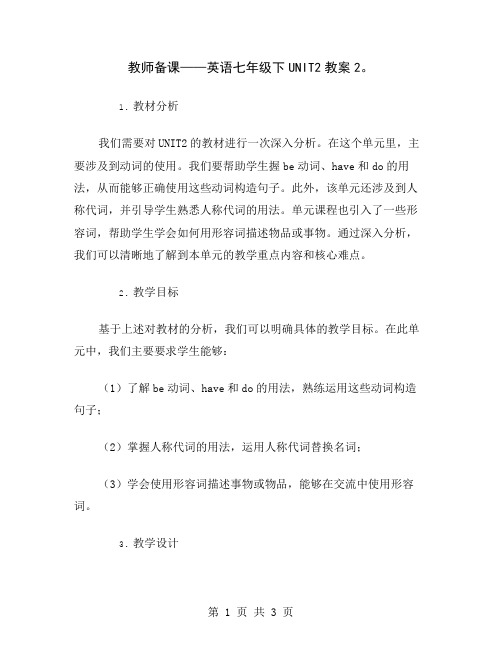
教师备课——英语七年级下UNIT2教案2。
1.教材分析我们需要对UNIT2的教材进行一次深入分析。
在这个单元里,主要涉及到动词的使用。
我们要帮助学生握be动词、have和do的用法,从而能够正确使用这些动词构造句子。
此外,该单元还涉及到人称代词,并引导学生熟悉人称代词的用法。
单元课程也引入了一些形容词,帮助学生学会如何用形容词描述物品或事物。
通过深入分析,我们可以清晰地了解到本单元的教学重点内容和核心难点。
2.教学目标基于上述对教材的分析,我们可以明确具体的教学目标。
在此单元中,我们主要要求学生能够:(1)了解be动词、have和do的用法,熟练运用这些动词构造句子;(2)掌握人称代词的用法,运用人称代词替换名词;(3)学会使用形容词描述事物或物品,能够在交流中使用形容词。
3.教学设计基于教材分析和教学目标,我们需要进行详细的教学设计。
我们可以通过提供一些生动的语言材料,向学生展示be动词、have和do 的用法。
在这个过程中,可以帮助学生发现一些常见的语言规律和用法,如肯定句、否定句和疑问句等。
同时,也可以通过练习帮助学生熟悉这些动词的使用方法。
我们可以引导学生熟悉人称代词的使用。
通过对语言材料的分析和练习,学生可以逐渐理解代词在句子中的作用和用法,并掌握有效地使用人称代词进行交际的技能。
我们可以引入形容词,让学生重点了解形容词与名词搭配方法,并且在生活实践中加强彼此搭配的印象。
在此过程中,教师要注意语言的生动性和趣味性,让学生更好地理解用法,同时,鼓励他们在交流中积极运用词汇。
4.教学评估在教学过程中,我们需要对学生的掌握情况进行评估。
在这个过程中,我们可以使用各种形式的评估方法,如听力、口语、阅读和写作等,以帮助学生全面地巩固并使用教材中的词汇和语法。
5.课后回顾最后要注意的是,教师在教学结束后,应该对教学过程进行总结和回顾,以保证学生可以更好地理解和掌握所学的内容。
在回顾过程中,可以和学生讨论一些重点难点,从而加深对其的印象,巩固所学的知识。
人教版英语七年级下册Unit2复习学案(无答案)

第二讲Unit 2 What time do you go to school? 【学习目标】1. 能够熟练地谈论关于日常安排的话题。
2.能掌握并运用关于时间表达和日常活动的短语。
3.能够灵活运用本单元的重点句型和语法点。
【知识梳理】1.请写出你知道的频率副词:(至少3个)2.请写出表达时间的短语:(至少5个)3.请写出关于起居的短语:(至少5个)4.请写出关于饮食就餐的短语:(至少3个)5.请写出关于运动的短语:(至少3个)6.请写出其他日常活动的短语:(至少3个)7.请写出谈论日常活动的问句和答句:(至少2组,用不同的人称)一.新课内容(一)知识点知识点2:重点语法1. get dressed►He can’t dress himself.►I usually dress my daughter before I go to work.【拓展】辨析wear, put on和dress2. From twelve o’clock at night to six o’clock in th e morning.►How far is it from your office to the bank?►We work from morning to night.3.At eleven o’clock, so I’m never late for work.►I’ll ____________(be) late for the meeting.我将开会迟到了。
►Please __________(not) be late for school.请上学不要迟到。
4. In our group, Li Fei usually gets up late on weekends.►My group has some good players.►A group of girls are cleaning the room.5. …so I usually eat very quickly.►The dog runs quickly.►Don’t eat quickly. It’s not a good habit.【拓展】quick adj.快的;迅速的。
【K12学习】七年级英语下册Unit2SunshineTown学案
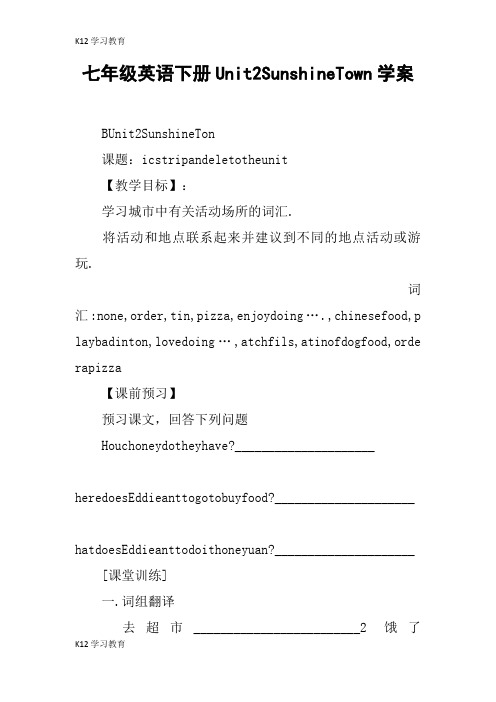
七年级英语下册Unit2SunshineTown学案BUnit2SunshineTon课题:icstripandeletotheunit【教学目标】:学习城市中有关活动场所的词汇.将活动和地点联系起来并建议到不同的地点活动或游玩.词汇:none,order,tin,pizza,enjoydoing….,chinesefood,p laybadinton,lovedoing…,atchfils,atinofdogfood,orde rapizza【课前预习】预习课文,回答下列问题Houchoneydotheyhave?_____________________ heredoesEddieanttogotobuyfood?_____________________hatdoesEddieanttodoithoneyuan?_____________________ [课堂训练]一.词组翻译去超市_________________________2饿了____________________________多少钱_________________________4多少听狗食_______________________订一个比萨饼___________________6计划一些活动______________________看电影_________________________8喜爱打羽毛球_____________________去不同的中餐馆_________________10带他们去运动中心_______________二.根据句意和首字母填空Thequestionisveryeasy,butn________ofuscananserit.Let’so________soecaesandfruit.e’llgotothec_________toseethatonderfulfil.Ilove__________ballgaes.Theyillgototheshopping_________tobuysoeclothes.canebuythefood________solittleoney?Ican’tfindyalan.________Ileftitintheclassroo.Heenjoys__________chinesefood.Ithinecangothereby.0.alalongtheroadyouseethepostoffice.1.Thereareonlytoofcoeinthefridge.Ican’tfindyalan.Ileftitintheclassroo.[课后巩固]一用所给词的适当形式填空Noneofthe________frotheU2.ouldyoulie_________tothes portscenterithe?Thereareat_________XXstudentsinourschool.janeliesshopping.Sheantstogotothe_________all.Agroupofexchangestudents_________theGreatallno.There________uchoneyinypocet.Thestudents____________ anactivityattheoent.Heloves_________basetball.Let’s____________it.Iouldlove________footballthisafternoon.0.Theteachertellsus________hard.二.句型转换Uncleangaybeathoe.________Uncleang________athoe.Ihavetocartonsofil.________________________ofil_______youhave?carolhasthreebottlesoforangejuice.____________________orangejuice_________carol________?Allofusliethisicboo.___________________________thisicboo.There’snodogfood.There________________dogfood.ehaveonly3yuan._________________________doyouhave?ecanbuy3tinsofcoeith20yuan.______________________ofcoecanyoubuyith20yuan?aybethereisafootballatchbeteenourclasses.There_______________afootballatchbeteenourclasses.三、翻译句子我可以点一份比萨和两听可乐吗?_________________________________________你的运动鞋花了多少钱?_________________________________________你有多少钱啊?_________________________________________我喜欢打羽毛球._________________________________________BUnit2SunshineTon课题:Reading【教学目标】:读懂,了解阳光镇的基本情况。
译林版英语七年级下册Unit 2 课堂复习学案

7下Unit 2 课堂复习学案一选择题(每小题1分,共15分)( ) 1. ---Mum, what ________ you like _________ for supper? ---I’d like rice and meat.A. do; eatB. shall; eatC. would; to eatD. will; eat( ) 2. Which floor do you live ___________ in this building?A. inB. onC. forD. of( ) 3. ---What time ___________ we ___________ tomorrow? ---At six in the morning.A. will; to meetB. do; meetC. shall; meetD. are; meeting ( ) 4. The song Welcome to Beijing ___________ nice.A. hearsB. soundsC. looksD. listens( ) 5. ---Shall we have a cup of tea? ---___________.A. Good ideaB. Thank youC. That’s OKD. Me too( ) 6. Miss Wu ___________ us with our lessons in the future.A. shall helpB. will helpC. is helpingD. helps( ) 7 There are about ten ___________ working in the police station.A. policemanB. policemenC. postmanD. postmen( ) 8. ---What do you have ___________ your neighborhood?---Supermarkets, restaurants, a school and a hospital.A. ofB. aroundC. aboveD. with( ) 9. I think computers are very useful. we can get ___________ on the Internet.A . game B. information C. idea D. message( ) 10. The man sitting under the tree is my___________. His flat is next to mine.A. neighbourB. visitorC. doctorD. teacher( ) 11. It takes about __________ hour to get to Danyang from Zhenjiang by _________bus.A. an; aB. a; anC. an; /D. a; /( ) 12.The engineers can help you if there is ___________ with your computer.A. anything wrongB.something wrongC. nothing wrongD. no wrong things ( ) 13. Each of the club members ___________ ready to help children in poor areas.A. isB. areC. amD. be( ) 14. There ___________ a football game this afternoon.A. will haveB. is going to beC. hasD. is going to have ( ) 15. Tom, with his classmates, ___________ the windows.A. is cleaningB. are cleaningC. cleaningD. clean( ) 16. --Do you usually go to work by _______ bus?--Yes. I usually go on _____ No. 2 Bus.A./; aB. a; /C. a; aD. the; a( ) 17. --Guess what I want to be when I grow up.--I think you want to be a(n) _____ . You love beautiful things, right?A. engineerB. artistC. nurseD. waiter( ) 18. --The question is so easy.--Maybe it is easy for most of us. But I don't think can answer it.A. someoneB. anyoneC. everyoneD. no one( ) 19. --I must thank Mrs Lee helping me so much _____ my Chinese.--That's true. You are much better at Chinese now.A. with; forB. for; forC. for; withD. of; with( )20. --How long does it take G44 to get to Xuzhou from Nanjing?--Maybe one hour. But why not _____ it on the Internet?A. fixB. seeC. lookD. check( ) 21. --_____ your new job , Jim?--Well, it is usually full of fun. But I have to keep busy.A. How is; likeB. What is; likeC. What does; likeD. How does; like ( ) 22. --Never walk on the left of the road, boy.--Thanks. I next time.A. won'tB. don'tC. can'tD. am not ( ) 23. --Women's Day is coming. I am thinking about ________ to buy for mother.--Good girl! What about a silk scarf for spring?A. howB. whenC. whereD. what( ) 24. --go on a picnic this afternoon? --It can't be better. I can't wait to go out with you.A. What aboutB. Shall weC. Will youD. Do we( ) 25. --Will you come to join us in the trip?--_ . You see, I have to get ready for my coming party.A. Thank youB. I'd love toC. I am afraid notD. All right( )26.Our teacher asks us English every day.A . read B. reads C . to read D. reading( ) 27. What about ______ our party ?A. beginsB. beginningC. beginD. to begin( )28. Millie is a good swimmer, and she can swim _______ a fish.A. likesB. is likeC. likeD. is likes( )29 .I can speak English ________, I am ______ at it.A. good, wellB. good, goodC. well, wellD. well, good()30. They will arrive _______ Beijing _______ April 20th.A. in; inB. at; atC. in; onD. at; on二、完形填空(每小题1分,共10分)Dear Miss Green,I'm happy to invite you to a welcome party for our new teacher from the USA.We’ll 1 the party in Sunshine Park from 8 to 11 2 Saturday evening, March 10. We’ll 3 at the party gate. We will have a picnic in the 4 . We would like everybody to bring 5 own food and drinks. We’ll also 6 different ball games. Let me tell you the way to Sunshine Park. It will be easy to get to the park 7 your building. Just turn left at the building. Walk straight on and you’ll see a bus stop on your right. 8 a No.8 bus and get off it when it comes to the second stop. Then you will see Sunshine Park in front of you. You can’t miss it. We 9 you can come. We hope to see you at our 10 .( ) 1. A. make B. hold C. take D. put( ) 2. A. at B. on C in D. about( ) 3. A. see B. look C. play D. meet( ) 4. A. office B. park C. school D. home( ) 5. A. her B. our C. your D. their( ) 6. A. do B. play C. take D. spend( ) 7. A. to B. of C. from D. in( ) 8. A. find B. carry C. take D. bring( ) 9. A. hope B. need C. want D. like( ) 10. A. park B. school C. home D. party三、阅读理解(每小题2分,共12分)(A)Dear Mum,I’m sorry that I can’t go back home for Mother’s Day next week. On that day, I’ll have to go to an important meeting for my boss, who helps me a lot with my work and life here. But I’ll find time to see you at home soon.Mum, thank you for everything you’ve done for Tim and me. After Dad died ten years ago, you had to work in a supermarket in the daytime and in a restaurant at night. But you always gave us two your love and care. Though you don’t have to work now, I still remember your coming home and feeling tired many evenings.Tim is going to finish his studies next month. He said he would move back from school and look for a job near home. I’m glad you won’t live by yourself any more. Let’s plan to take a trip in the near future. Happy Mother’s Day, I love you, Mom.John( ) 1. How many jobs did the mother take after her husband died?A. One.B. None.C. Two.D. Three.( ) 2.Why can’t John go back home for Mother’s Day?A. Because he doesn’t like his mother.B. Because his brother can come back home.C. Because he has something important to do.D. Because they never celebrate Mother’s Day. ( ) 3. What can we learn about John’s mother?A. She lives by herself now.B. She still works day and night.C. She will make a plan to save money.D. She couldn’t look after her children.(B)A school party will be held on Sunday evening. The girls are talking about clothes.“I shall wear a black dress, so everybady will notice me,”says Emily. “What aboput you, Linda?”“I am not sure. Maybe I'll wear jeans, an old skirt and a hat.People will notice me, too!”Linda says.“What shall we do about the boys?” says Jane.“I hear that some of boys learn to dance better this summer. Maybe it'll be better this time,” says Mary.It is Sunday evening. Groups of students arrive. The music begins, The girls stand in a line on one side, and the boys on the other side. Mr Green, their teacher, tries to get them together, but fails. After a while Tim says,“I don't want to stand here the whole time. The party is only for two hours. it'll be over soon.”He starts to dance. All the others watches him. Then David asks Emily if she wants to dance. Then Jack and linda. Then all begin to dance. Soon there are more dancers than watchers.4 .On Sunday evening,________ will be held.A. a birthday partyB. a dance competitionC. a school partyD. a school meeting5. When does the music begin?A.Tim says something.B. Some students start to dance.C. The girls stand in a line on one side and the boys on the other side.D. Groups of the students arrive.6.. What does Tim really mean?A. Students should start to dance.B. students should stand the whole time.C. The party will last two hours.D. He will leave the party quickly.CAll students need to have good habits(好习惯):When you have good study habits, you learn things quickly. You also remember them easily.Do you like to study in the living room? This is not a good place because it is usually too noisy. The telephone bell rings there; the TV is there, and sometimes it is a good place for your pet dog or cats to play and rest. You need to study in a quiet place, like your bedroom. A quiet place will help you only think about one thing, and you will learn better.Before you begin to study, do not forget to clean your desk. A good desk light is important, too. You’ll feel tired easily if there is not enough light. So you should have a clean and bright lamp. To tell you the truth, the most important is that you should put your heart into your study.7.When you have good study habits, you will __________.A . learn things quickly B. remember things easily C . think about one thing D. both A and B8. You'll feel tired easily if the light is __________.A. goodB. enough C . bad D. wonderful9.You should remember to _________ before you study.A. clean the deskB. tidy the roomC. turn on the lightD. go to the bedroom10.The best title (标题) for this passage (文章) is __________.A. Study in the bedroomB. Good study habitsC. How to studyD. Desk light is important四看音标写单词(每小题1分,共10分)1.[ʹbrəʊkən]________________2. [ʹeniwʌn]__________________3.[ʹfjuːtʃə(r)____________4.[ʹlʌki]_____________5.[ʹkɒlɪdʒ]_____________6[ʹnəʊtɪs]_________7[sɪk]____________8 [ʃəl]___________9[tʃek]______________10 [ʹvɪzɪtə(r)]_______________五词汇(每小题1分,共10分)A2. Eating too much sea food makes me .3. A mother often about her child's safety(安全) very much.4. Jim often helps his neighbor, an 80-year-old man, do some ________________________.5. Both my parents are office in the town.B)用所给词的适当形式填空。
新人教版七年级英语下册Unit2第三课时学案
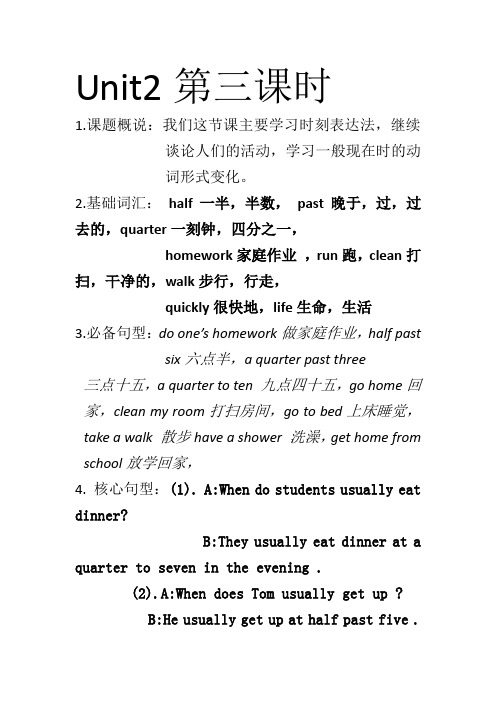
Unit2第三课时1.课题概说:我们这节课主要学习时刻表达法,继续谈论人们的活动,学习一般现在时的动词形式变化。
2.基础词汇:half一半,半数,past晚于,过,过去的,quarter一刻钟,四分之一,homework家庭作业,run跑,clean打扫,干净的,walk步行,行走,quickly很快地,life生命,生活3.必备句型:do one’s homework做家庭作业,half pastsix六点半,a quarter past three三点十五,a quarter to ten 九点四十五,go home回家,clean my room打扫房间,go to bed上床睡觉,take a walk 散步have a shower 洗澡,get home from school放学回家,4. 核心句型:(1). A:When do students usually eat dinner?B:They usually eat dinner at a quarter to seven in the evening .(2).A:When does Tom usually get up ?B:He usually get up at half past five .(3).I have a very healthy life .5.【练习1】读出下面的时间:1)6:30 AM half past six in the morning 2)3:15 PM a quarter past three in the afternoon3) 6:45 PM a quarter to seven in the evening4) 9:45 PM a quarter to ten in the evening5) 11:00 AM eleven o’clock in the morning6.根据下表信息,仿照例句编写对话。
初中英语_英语七年级下册 Unit 2教学设计学情分析教材分析课后反思

《Unit 2 I ’ m going to study computer science.》SectionA教学设计Section A Review(复习学案)一、【学习目标】Learning aims(一)知识目标1)熟练运用Section A出现的单词和短语2)能正确默写出Section A中的重点句子(二)技能目标学习并使用be going to做题(三)情感目标1)通过小组合作学习培养合作互助的理念;2)通过谈论未来的职业,树立为理想奋斗的信念。
二、【学习重点】1)熟练运用Section A出现的单词、短语、句型谈论自己的理想工作;2)能顺利完成任务八,写出报告。
三、【导学过程】Step1 课前预习,自主学习,完成任务一:词型转换1. violin(n. )→(n. )小提琴手2. piano(n. )→(n. )钢琴家3. drive(v. )→(n. )司机4. science(n. )→(n. )科学家5. teach(v. )→(n. )教师6. cook(v. )→( n. )厨师7. act(v. )→( n. )演员8.engine (n. 机车) →( n. )机械师、工程师9. play(v. )→(n. )运动员10.write (v. )→( n. )作家.构词法表示……的人1.名词+ist→表示职业的名词。
violin → violinist piano → pianistscience → scientist art→ artist(艺术家)2.动词+er/or/ress→表示职业名词teach → teacher act → actor actressdrive → driver visit → visitor (参观者)play → player swim → swimmer (游泳的人)Step2 词汇达标,完成任务二一、根据句意及汉语提示写单词。
1.Tom's father and brother are both ________(厨师).2.Tell me where this ________(飞行员)comes from.3.The boy wants to be a(n) ________(司机).4.How many ________(医生) are there in this hospital?5.The two ____ ____(工程师) are discussing a plan of the city.二、用所给词的适当形式填空。
七年级下英语Unit2 第一课时学案
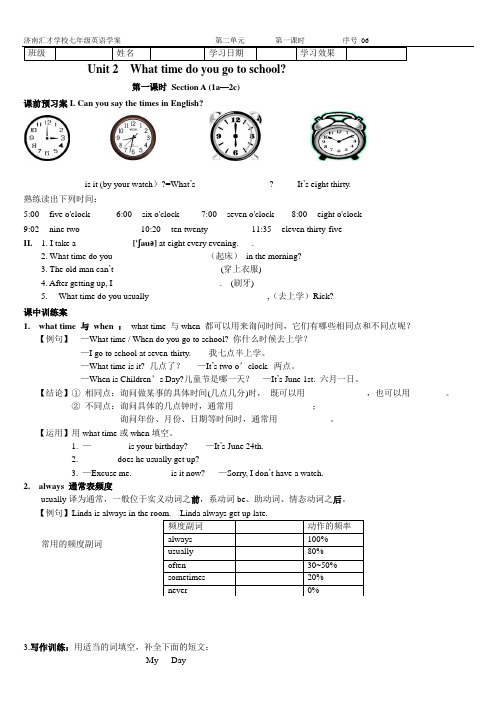
班级姓名学习日期学习效果Unit 2 What time do you go to school?第一课时Section A (1a—2c)课前预习案I. Can you say the times in English?________________ ______________ ________________ _____________--- _____ ______is it (by your watch)?=What’s ________ ________? --- It’s eight thirty.熟练读出下列时间:5:00 -- five o'clock 6:00 -- six o'clock 7:00 -- seven o'clock 8:00 -- eight o'clock9:02 -- nine two 10:20 -- ten twenty 11:35 -- eleven thirty-fiveII. 1. I take a ____________ ['ʃauə] at eight every evening. .2. What time do you _________ _________ (起床)in the morning?3. The old man can’t ___________ ___________(穿上衣服)4. After getting up, I ___________ ___________. (刷牙)5. ---What time do you usually________ ________ __________,(去上学)Rick?课中训练案1. what time 与when :what time 与when 都可以用来询问时间,它们有哪些相同点和不同点呢?【例句】—What time / When do you go to school? 你什么时候去上学?—I go to school at seven-thirty. 我七点半上学。
新人教版七年级下Unit 2学案第3稿

(英)15707 Unit 2 What time do you get to school?Section A 1a--2b, Section B 1a--1b, P:3a,3b ) Period 1主备:刘佳佳同备:王雨审核:陈桂杰备课时间:2013. 2. 【学习目标】1.通过观察钟表,快速说出钟表时间,并且能够在实际应用中正确询问,书写时间。
2. 运用所学的时间表达法去询问日常作息时间。
【自主预习】1.预习重点单词、词组。
1)起床________2)穿上衣服_____________3)刷_______4)牙齿(单复)_____ _____5) 洗淋浴____________6)通常地_______________ 7)从不,绝不___________8)总是__________9)四十_______10)五十 ______________11)早的_______________12)在周末______________13)一半_____________14) 晚于,过去的_________15)一刻钟 ___________16) 9:50____________17)最好的_________18)在上学期间________2. 翻译下面句子:1)你通常什么时间起床,Rick?我通常6:30起床。
_______________________________________ 2)Jim 家有一个淋浴器。
______________________3)我从不起床那么早。
___________________ 4)你最好的朋友什么时间去上学?______________________________________________________ 5)他们什么时候穿衣? ______________________________6)Rick什么时间吃早饭?7他在7点吃。
__________________ 7)你的朋友们什么时间锻炼身体?他们通常在周末运动。
七下英语学案Unit 2 I’ll help to clean up the city park.
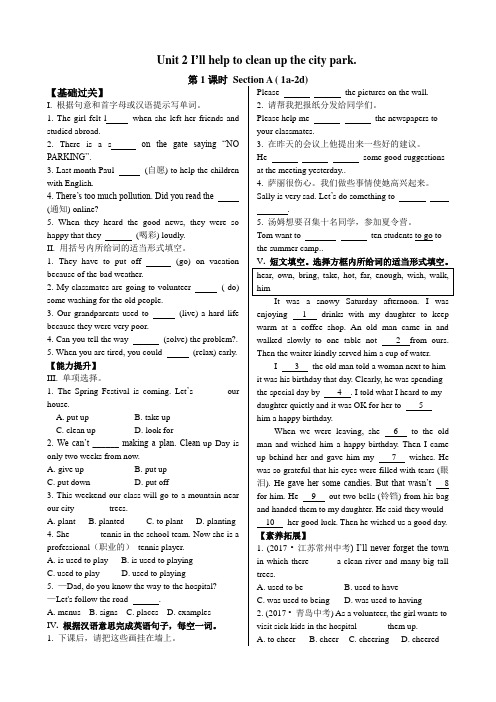
Unit 2 I’ll help to clean up the city park.第1课时Section A ( 1a-2d)【基础过关】I. 根据句意和首字母或汉语提示写单词。
1. The girl felt l when she left her friends and studied abroad.2. There is a s on the gate saying “NO PARKING”.3. Last month Paul (自愿) to help the children with English.4. There’s too much pollution. Did you read the(通知) online?5. When they heard the good news, they were so happy that they (喝彩) loudly.II. 用括号内所给词的适当形式填空。
1. They have to put off (go) on vacation because of the bad weather.2. My classmates are going to volunteer ( do) some washing for the old people.3. Our grandparents used to (live) a hard life because they were very poor.4. Can you tell the way (solve) the problem?.5. When you are tired, you could (relax) early. 【能力提升】III. 单项选择。
1. The Spring Festival is coming. Let’s_______ our house.A. put upB. take upC. clean upD. look for2. We can’t ______ making a plan. Clean-up Day is only two weeks from now.A. give upB. put upC. put downD. put off3. This weekend our class will go to a mountain near our city _______ trees.A. plantB. plantedC. to plantD. planting4. She ______ tennis in the school team. Now she is a professional(职业的)tennis player.A. is used to playB. is used to playingC. used to playD. used to playing5. —Dad, do you know the way to the hospital? —Let's follow the road .A. menusB. signsC. placesD. examplesIV. 根据汉语意思完成英语句子,每空一词。
人教英语七年级下册Unit2词汇学案(无答案)

Unit2 词汇学案1. up /ʌp/ adv.向上up 副词,意为“向上”反义词:downup and down 来来回回,往返地;look up and down 上下打量___________________ 养育___________________ 建立___________________ 熬夜___________________ 想出;提出___________________露面;出现pick up , put up give upget up意为“起床”,反义词组:go to bedget 得到;拿;取;理解----getting(动名词)get up 起床get to到达get home到家get on上车get off 下车get dressed穿衣get out出去get back回来get together相聚get ready for为……做准备get married结婚2.dress/dres/ v.穿衣服n.连衣裙This is my sister's dress. Someone can’t be valued only from his dress.The boy can dress himself. to dress a shop windowdress作及物动词时,其后要跟表示人的名词、代词或反身代词作宾语,给某人穿衣服/自己穿衣服,其后不能跟衣服或鞋帽。
get dressed是固定搭配,意为“穿上衣服”。
be dressed in(=wear)穿着……衣服;dress up 装扮;dress up as 乔装打扮成;dress sb. in给某人穿上……衣服①Though the little boy is young, he can dress _______(he)without anyone's help.②He likes to ___________(乔装打扮成)Santa Claus to give away presents to children.③The girl ___________(穿着)her new dress, so she moves very carefully to avoid getting her new dress dirty.3.brush /brʌʃ/ v.刷;刷净n.刷子We gave him paint and brushes.The little girl drew a beautiful picture with a brush.After getting dressed, she usually brushes her teeth first.He brushed his tears away and smiled.toothbrush hairbrush4.tooth /tuːθ/ n.牙齿___________________ 复数___________________ 合成词(牙痛)___________________ 合成词(牙刷)___________________ 刷牙拓展:1)一些名词的复数是不规则变化的。
人教版七年级下学期英语学案设计:unit 2 What time do you go to scho
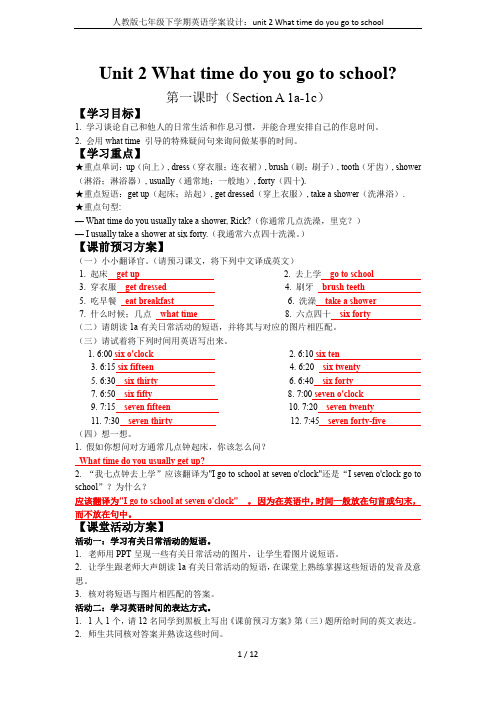
Unit 2 What time do you go to school?第一课时(Section A 1a-1c)【学习目标】1. 学习谈论自己和他人的日常生活和作息习惯,并能合理安排自己的作息时间。
2. 会用what time 引导的特殊疑问句来询问做某事的时间。
【学习重点】★重点单词:up(向上), dress(穿衣服;连衣裙), brush(刷;刷子), tooth(牙齿), shower (淋浴;淋浴器), usually(通常地;一般地), forty(四十).★重点短语:get up(起床;站起), get dressed(穿上衣服), take a shower(洗淋浴).★重点句型:— What time do you usually take a shower, Rick?(你通常几点洗澡,里克?)— I usually take a shower at six forty.(我通常六点四十洗澡。
)【课前预习方案】(一)小小翻译官。
(请预习课文,将下列中文译成英文)1. 起床get up2. 去上学go to school3. 穿衣服get dressed4. 刷牙brush teeth5. 吃早餐eat breakfast6. 洗澡take a shower7. 什么时候;几点what time 8. 六点四十six forty(二)请朗读1a有关日常活动的短语,并将其与对应的图片相匹配。
(三)请试着将下列时间用英语写出来。
1. 6:00 six o'clock2. 6:10six ten3. 6:15 six fifteen4. 6:20 six twenty5. 6:30six thirty6. 6:40six forty7. 6:50six fifty 8. 7:00seven o'clock9. 7:15seven fifteen 10. 7:20seven twenty11. 7:30seven thirty 12. 7:45seven forty-five(四)想一想。
人教版七年级英语下unit2 section A 学案(含练习和答案)
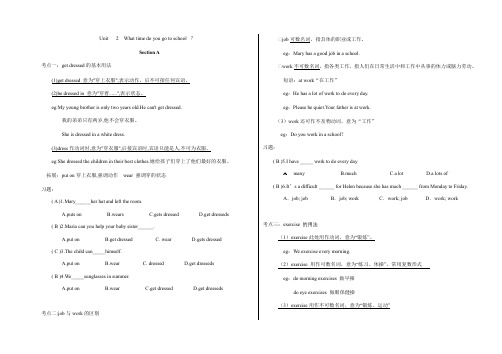
Unit 2 What time do you go to school ?Section A考点一:get dressed的基本用法(1)get dressed 意为"穿上衣服",表示动作。
后不可接任何宾语。
(2)be dressed in 意为"穿着......",表示状态。
eg:My young brother is only two years old.He can't get dressed.我的弟弟只有两岁,他不会穿衣服。
She is dressed in a white dress.(3)dress作动词时,意为"穿衣服",后接宾语时,宾语只能是人,不可为衣服。
eg:She dressed the children in their best clothes.她给孩子们穿上了他们最好的衣服。
拓展:put on穿上衣服,强调动作wear 强调穿的状态习题:( A )1.Mary______her hat and left the room.A.puts onB.wearsC.gets dressedD.get dresseds( B )2.Maria can you help your baby sister______.A.put onB.get dressedC. wearD.gets dressed( C )3.The child can_____himself.A.put onB.wearC. dressedD.get dresseds( B )4.We_____sunglasses in summer.A.put onB.wearC.get dressedD.get dresseds考点二:job与work的区别⑴job可数名词,指具体的职业或工作。
eg:Mary has a good job in a school.⑴work不可数名词,指各类工作,指人们在日常生活中和工作中从事的体力或脑力劳动。
初中七年级英语学案-Unit 2 Going to see a film 精品

Unit 2 Going to see a film 【学习目标】1.能正确理解和运用本课出现的重要单词和短语。
2.读懂课文,能掌握主要信息和细节信息,并能介绍相关内容。
【学习重难点】1.正确理解和运用本课出现的重要单词和短语。
2.掌握主要信息和细节信息,并能介绍相关内容。
【学习过程】the following phrases.选择一部电影。
_____________________________________.看一个电影指南。
_____________________________________.讨论去看哪一部电影。
_____________________________________.“愚蠢的小丑”。
_____________________________________.滑稽电影。
_____________________________________.动作片。
_____________________________________.警察和强盗。
_____________________________________.上小提琴课。
_____________________________________.上钢琴课。
_____________________________________.往电影院去的路。
_____________________________________.向左转入Water 大街。
_____________________________________.在地图上。
_____________________________________.最短的路线。
_____________________________________.在马戏团。
_____________________________________.四个公主。
_____________________________________.一次冒险。
新人教版七年级英语下册Unit2第一课时学案
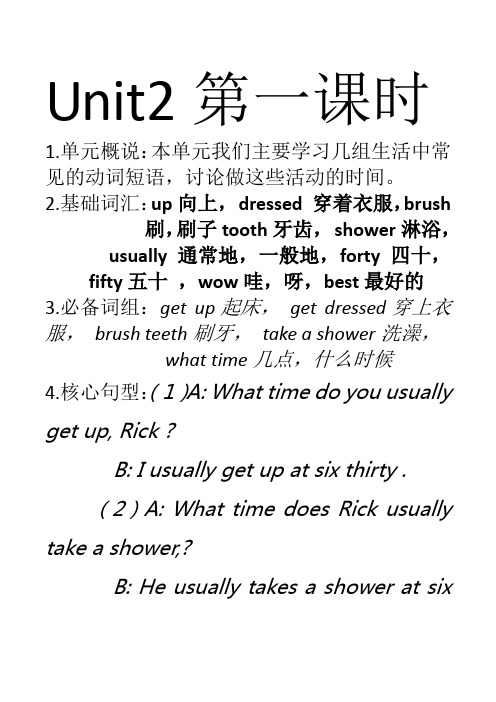
Unit2第一课时1.单元概说:本单元我们主要学习几组生活中常见的动词短语,讨论做这些活动的时间。
2.基础词汇:up向上,dressed 穿着衣服,brush刷,刷子tooth牙齿,shower淋浴,usually 通常地,一般地,forty四十,fifty五十,wow哇,呀,best最好的3.必备词组:get up起床,get dressed穿上衣服,brush teeth刷牙,take a shower洗澡,what time几点,什么时候4.核心句型:(1)A: What time do you usually get up, Rick ?B: I usually get up at six thirty .(2)A: What time does Rick usually take a shower,?B: He usually takes a shower at sixforty .【巩固练习】仿照核心句型,根据下面信息分别使用第一人称和第三人称来编写对话。
1).Bob –get up-7:002).Mary-go to school-7:303).Jack-get dressed-6:404).Jim-brush teeth-5:505).Anna-take a shower-20:306).Rick-eat breakfast-6:155.读下面的对话并且理解对话的意思。
A: What time do you usually get up ?B: I always get up at five fifty .A: Wow!I never get up so early .【巩固练习】用always,usually或never写出答语或问句。
1).What time do you get up on school days ? ____________________.2). ____________________? Rick always gets up at 6:20 .3).What time do you have breakfast ? ____________________.4). ____________________? Anna never eats breakfast .5).What time does your best friend go to school? ___________________.6.考点精讲:1).go to school; go to the school 2}.brushone’s teeth 3}.take a shower=have a shower/bath 4}.频率副词:always,usually,never。
新人教版七年级英语下册Unit2第四课时学案
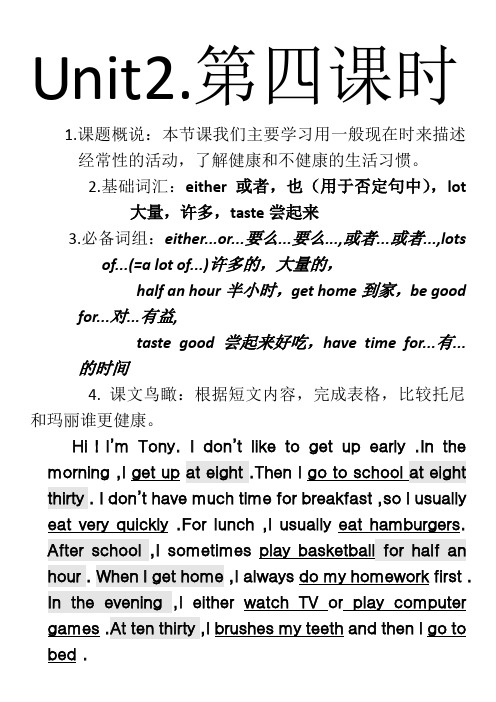
Unit2.第四课时1.课题概说:本节课我们主要学习用一般现在时来描述经常性的活动,了解健康和不健康的生活习惯。
2.基础词汇:either或者,也(用于否定句中),lot大量,许多,taste尝起来3.必备词组:either...or...要么...要么...,或者...或者...,lotsof...(=a lot of...)许多的,大量的,half an hour半小时,get home到家,be good for...对...有益,taste good 尝起来好吃,have time for...有...的时间4. 课文鸟瞰:根据短文内容,完成表格,比较托尼和玛丽谁更健康。
Hi!I’m Tony. I don’t like to get up early .In the morning ,I get up at eight .Then I go to school at eight thirty . I don’t have much time for breakfast ,so I usually eat very quickly .For lunch ,I usually eat hamburgers.After school ,I sometimeshour . When I get home ,I always do my homework first .In the evening ,I either watch TV or play computer games .At ten thirty ,I brushes my teeth and then I go to bed .Mary is my sister .She usually gets up at six thirty .Then she always takes a shower and eats a goodbreakfast. After that ,shethirty .At twelve ,she eats lots of fruit and vegetablesfor lunch .After lunch ,she sometimes plays volleyball.She always eats ice-cream after dinner . She knowsit’s not good for her ,but it tastes good .In theevening ,she does her homework and usually swims5.难点句型解析:(1)I don’t like to get up early .我不喜欢早起。
七年级英语下Unit2 What time do you go to school 第二课时学案 2
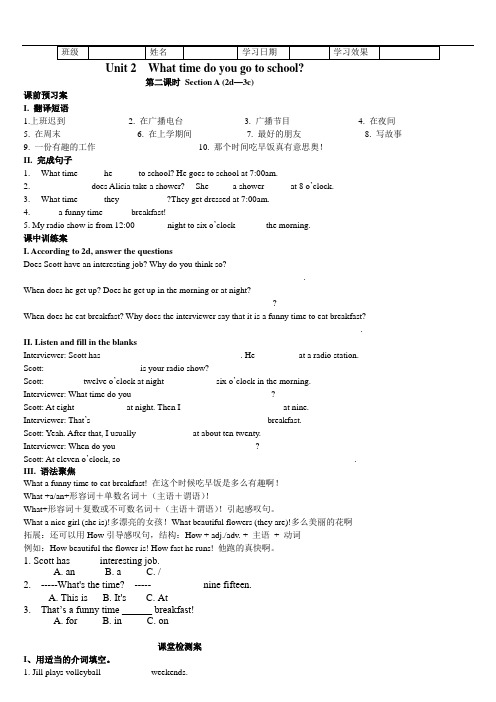
班级姓名学习日期学习效果Unit 2 What time do you go to school?第二课时Section A (2d—3c)课前预习案I. 翻译短语1.上班迟到______________2. 在广播电台______________3. 广播节目_______________4. 在夜间_______________5. 在周末_________________6. 在上学期间____________7. 最好的朋友______________8. 写故事______________9. 一份有趣的工作______________________ 10. 那个时间吃早饭真有意思奥!_______________________________ II. 完成句子1. ---What time _____ he _____ to school? He goes to school at 7:00am.2.---______ _____ does Alicia take a shower? ---She_____ a shower _____ at 8 o’clock.3. ---What time _____ they _____ _____?They get dressed at 7:00am.4. ______a funny time ______breakfast!5. My radio show is from 12:00_______ night to six o’clock ______ the morning.课中训练案I. According to 2d, answer the questionsDoes Scott have an interesting job? Why do you think so?________________________________________________________________.When does he get up? Does he get up in the morning or at night?_________________________________________________________?When does he eat breakfast? Why does the interviewer say that it is a funny time to eat breakfast?_____________________________________________________________________________.II. Listen and fill in the blanksInterviewer: Scott has ________ _________ _____________ . He _________ at a radio station.Scott: ___________ __________is your radio show?Scott: ________ twelve o’clock at night ___________ six o’clock in the morning.Interviewer: What time do you___________ __________ __________?Scott: At eight ___________ at night. Then I ___________ ___________ at nine.Interviewer: That’s _________ _________ ___________ _________ breakfast.Scott: Yeah. After that, I usually ____________ at about ten twenty.Interviewer: When do you___________ __________ __________?Scott: At eleven o’clock, so _________ ___________ __________ ____________ _________.III. 语法聚焦What a funny time to eat breakfast! 在这个时候吃早饭是多么有趣啊!What +a/an+形容词+单数名词+(主语+谓语)!What+形容词+复数或不可数名词+(主语+谓语)!引起感叹句。
人教版英语七年级下册_Unit2_单元学案

1. what time几点
2. go to school去上学
3. get up起床
4. take a shower洗淋浴
5. brush teeth刷牙
6. get to到达
7. do homework做家庭作业
8. go to work去上班
9. go home回家
10. eat breakfast吃早饭
Usually, I get up early.通常,我起得很早。
2)usually的形容词是usual,意为“通常的,平常的”。常用于词组as usual,意为“像平常一样”。它的反义词是unusual,意为“罕有的,不同寻常的”。
例如:
He works very hard.他工作很努力。
There are 30 workers in the factory.工厂里有30个工人。
2)work名词,意为“工作”,是不可数名词,但表示一份工作可以用“a piece of work”。
常用于以下词组:
out of work失业/下岗at work在上班
4. fifteen/a quarter to +基数词差一刻到…点
5. take a/an+名词从事…活动
6. from…to…从…到…
7. need to do sth需要做某事
◆话题写作
主题:谈论日常作息习惯
My School Day
I am a student. I usually get up at seven, and I eat breakfast at seven thirty. Then I go to school at eight. School starts at eight thirty. I eat lunch at twelve. I go home at 17:00. I often eat dinner at 19:00 and then play the piano. I do my homework at 20:00. At 22:00, I go to bed.
新人教版七年级英语下册Unit2第二课时学案
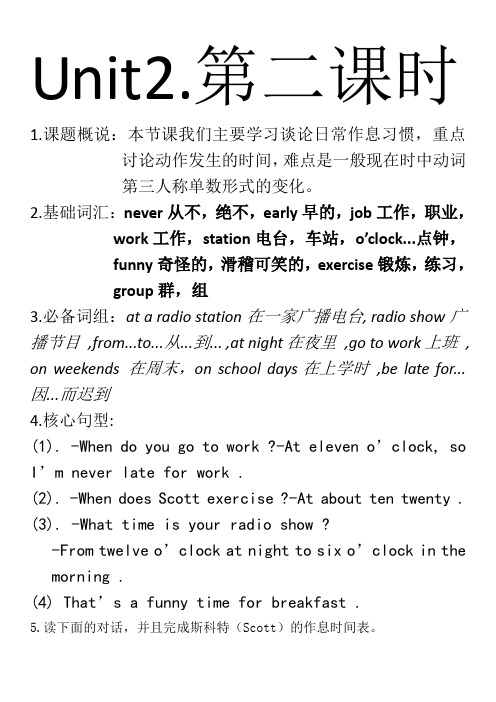
Unit2.第二课时1.课题概说:本节课我们主要学习谈论日常作息习惯,重点讨论动作发生的时间,难点是一般现在时中动词第三人称单数形式的变化。
2.基础词汇:never从不,绝不,early早的,job工作,职业,work工作,station电台,车站,o’clock...点钟,funny奇怪的,滑稽可笑的,exercise锻炼,练习,group群,组3.必备词组:at a radio station在一家广播电台, radio show广播节目,from...to...从...到... ,at night在夜里,go to work上班, on weekends 在周末,on school days在上学时,be late for...因...而迟到4.核心句型:(1). -When do you go to work ?-At eleven o’clock, so I’m never late for work .(2). -When does Scott exercise ?-At about ten twenty .(3). -What time is your radio show ?-From twelve o’clock at night to six o’clock in the morning .(4) That’s a funny time for breakfast .5.读下面的对话,并且完成斯科特(Scott)的作息时间表。
Interviewat a radio station .Scott ,what time is your radio show ? Scott: From twelve o’clock at night to six o’clock in the morning .Interview: What time do you usually get up ? Scott: A t eight thirty at night .Then I eat breakfast at nine .Interview: That’s a funny time for breakfast . Scott: Yeah .After that, I usually exercise at about ten twenty .Interview: When do you go to work ?Scott: A t eleven o’clock, so I’m never late for work .根据对话内容,回答或者写出问句。
- 1、下载文档前请自行甄别文档内容的完整性,平台不提供额外的编辑、内容补充、找答案等附加服务。
- 2、"仅部分预览"的文档,不可在线预览部分如存在完整性等问题,可反馈申请退款(可完整预览的文档不适用该条件!)。
- 3、如文档侵犯您的权益,请联系客服反馈,我们会尽快为您处理(人工客服工作时间:9:00-18:30)。
Unit 2学案Where is the post office?河南省实验中学王凤【教学目标】1.to learn how to ask for directions on the street.2. to learn how to give directions on the street 【重点词组】1.on Center Street2.across from3.next to4.in front of5.between … and …6.behind the library7.in the neighborhood8.post office9.pay phone10.go straight11.turn left12.take a walk through the park13.a good place to have fun14.an old hotel15.a busy street16.the way to my house17.on your right【重点句型】1.Is there a bank near here?Yes, there is. It’s on Center Street.2.Where’s the library?It’s between the restaurant and the supermarket.3.Is there a hotel in the neighborhood?4.Just go straight and turn left. It’s down Bridge Street on the right.I t’s next to a supermarket.5.----Thank you very much. / Thanks a lot.----You’re welcome. / That’s all right.6.Next to the hotel is a small house with an interesting garden.7.This is the beginning of the garden tour.8.Bridge Street is a good place to have fun.9.Write a tour guide for your neighborhood.10.Turn left on First Avenue and enjoy the city’s quiet streets andsmall parks.11.If you’re hungry, you can buy some food in the supermarket.12.I know you are arriving next Sunday.13.Let me tell you the way to my house.14.You pass a bank on your right and then go down Long Street.I hope you have a good trip.教学步骤Period One: Section A (1a—Grammar Focus)【重难点解析:】1.post office 邮局2.library 图书馆。
其复数为libraries. 如:two libraries两个图书馆3.bank 银行;河岸The bank of China 中国银行A river has two banks. 一条河有两个岸。
4.pay phone 投币式公用电话5.Is there a … near here? 附近有一个……吗?常用来问路。
如:Is there a bank near here ?6.It’s on Center Street. 它在中央大街。
在街上美国英语常用on.(英国英语用in)如:There is a restaurant on Bridge Street.7.across from 在……对面= on the other side of如:The house is across from the street.= The house is on the other side of the street.8.next to 紧挨;邻近。
如:He sits next to me. 他紧挨着我坐。
9.between…and ……与……之间。
用于两者之间,注意用宾格。
如:He is between Tom and me.他在我和汤姆之间。
10.in front of 在……前面(物体外部)如:There is a tree in front of our classroom.我们教室前有一棵树。
(树在教室外)In the front of 在……前面。
(物体内部)。
如:There is a desk in the front of our classroom. 我们教室前有一张桌子。
(教室内部)11.behind 在……后面。
方位介词。
如:behind the chair. 在椅子后。
12.Fifth Avenue. 第五大街。
专有名词,前不用定冠词the。
13.询问地点用Where’s +地点?回答用It’s… 如:Where’s the supermarket? It’s on Center Street.超市在什么地方?在中央大街。
14. There be 句型的用法口诀:“有”字放前面,有“啥”放中间,“地点、时间”放后面。
(1)用法:“某地存在某物/人”即强调某人或某物与某地的位置关系。
(2)结构:“There be + 主语+ 介词短语”存在(有)某人/物某地▲注意:当There be句型的主语是两个或两个以上的由and连接的并列主语时,be动词要与最近的主语保持一致。
E.g.There is an apple and two pears on the desk.桌子上有一个苹果和两个梨子。
There are two pears and an apple on the desk.桌子上有两个梨子和一个苹果。
(3)There be句型的一般疑问句及其回答。
一般疑问句把be 动词提前。
如:Is there an egg on the desk? Yes, there is/No, there isn’t.Are there any birds in the tree? Yes, there are.(4)There be句型的否定句。
直接在be动词后加not. 如:There aren’t any books on the desk.( 5 ) There be 句型与have的区别:前者强调的是一种位置关系;have强调的是一种所属关系。
如:There is a pen on my desk. 我桌子上有一支笔。
(笔在我桌子上,但不一定是我的。
)I have a pen. 我有一支笔。
(不管笔在哪,都是属于我的。
)小知识总结:1. There be 句型2. across from; next to; in front of; between …andbehind等方位介词的用法练一练:一用be 的适当形式填空:1.There __ a pen near the ruler.2.There ___ 2 books on the table.3.There __ a pen and two books on the table.4. There ___ 2 books and a pen on the table.二英汉互译1. in front of __________2. pay phone_____________3. between…and …________4. near here___________5.. 邮局___________6..在……旁边____________7..在……对面_________________三翻译句子:1.-----这附近有银行吗?-----有, 在邮局的对面。
2. -----附近有酒店吗?------有,中央大街有一家。
3. ------这附近有超市吗?------有,就在医院和公园中间。
4.我的书包里有2本词典。
5. 这附近有超市吗? 没有。
Period Two: Section A (3a—4)Section B (1a—2c)【重难点解析:】1.Excuse me 对不起;打扰了;请原谅。
Excuse me / sorry. 前者为客套语,常用于“向人问路”、“要离开(会场,活动等)”、“插话”、“请求许可”、“向对方询问情况,可能引起对方不快等场合。
”Sorry 侧重于事后对所犯的过错或不能满足对方要求而向对方表示歉意的场合。
2. in the neighborhood 在附近There is a park in the neighborhood. 附近有一个公园。
3.Just 用在祈使句中,意为:“就请……吧;尽管……好了”。
如:Just let me help you. 就让我帮助你吧。
4.go straight 一直走。
Straight “一直”,副词,放动词后,常用于指示方向。
如:go straight down the road. 沿着这条路走下去。
5. turn left / right 向左/右转。
Turn left / right at the…turning/crossing .在第个路口向左/右转。
如:Turn right at the first crossing.在第一个路口向右转。
Turn left/right on/at +街道(地点)。
在某地向左/右转。
如:Turn left at New Park. 在新公园向左转。
Turn right on Green Street. 在格林大街向右转。
6.down 1)副词。
“向下,下去”。
位于动词后。
如:sit down 坐下2)介词。
“沿着”。
如:Go down this street. 沿着这条街走。
7. on the left/right 在左/右边。
o n one’s left/right 在某人的左/右边。
o n the left/right of…在……的左右边如:There is a supermarket on the left. 在左边有一家超市。
Lucy sits on Lily’s right. 露西坐在莉莉右边。
You can see a school on the right of the bank.你能看到银行右边有一所学校。
